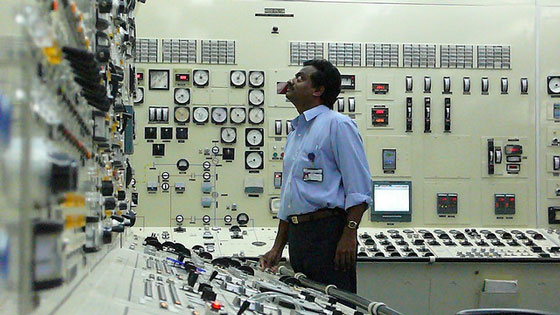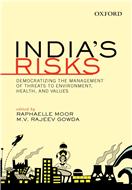by Raphaelle Moor

A prospective superpower, India is grappling with a host of risks that threaten to hamper its progress towards becoming a more economically successful, egalitarian, safe and harmonious society. India’s population routinely deals with the risks from HIV/AIDS, earthquakes, floods, industrial accidents and environmental disasters, and more recently the risks and uncertainties brought about by rapid advances in science and technology, such as BT Brinjal (GM Aubergine) and nuclear power.
Social movements in India have long voiced concerns around the processes for deciding whether a risk is ‘safe’ or ‘acceptable’ and who is taking these decisions. They have pointed to a noticeable imbalance in the type of knowledge and expertise which has been shaping key policies, legislations and institutions. They have also fought for communities’ perceptions of risk and local knowledge to be included in these processes. Uncertainty over where the line should lie between science and politics during the assessment of risks, and how to reconcile divergent risk perceptions, has triggered a large number of protests over the years.
Whilst psychologists, sociologists, anthropologists, political theorists, philosophers and scientists in the West have vigorously debated these various issues around risk over the last 50 years, this multidisciplinary field of academic research on risk has been relatively unexplored in India. Little research and resources have been invested in exploring these issues and Western scholars have also, for the most part, been reluctant to engage with these issues in India. The Journal of Risk Research, for example, has relatively few articles examining risks in developing countries.
In an effort to address this gap in the field, the STEPS Centre and the Centre for Public Policy at the Indian Institute of Management Bangalore initiated a project entitled ‘Risk, uncertainty and technology in India’, funded by the UK India Education Research Initiative. An international conference was organized at the Indian Institute of Management Bangalore in February 2011 which brought together Indian and Western scholars and practitioners across the fields of psychology, anthropology, law, politics, sociology, public health, philosophy, science and architecture. Together they offered insights on the theory of risk, lessons from the West, and the realities of risk in India. These conference papers have now been revised and updated and included in the recently published volume India’s Risks: Democratizing the Management of Threats to Environment, Health and Values, edited by Raphaelle Moor and M.V. Rajeev Gowda (OUP India, 2014).
This volume analyses different but profoundly interdependent risks such as nuclear power, Bt Brinjal, environmental decision-making, maternal mortality, H1N1, HIV/AIDS and post disaster reconstruction through the same analytical framework. It delves into the meaning of risk in India, asking what it signifies for policymakers and different factions of society.
It also probes the political, social, and economic dynamics that have shaped the very different constructions of risk in India. In particularly, we ask how India’s aspirations to become the next leading superpower have framed policymakers’ assessments of scientific and technological risks? What knowledge and expertise do policymakers tend to consider relevant to include in their risk assessments? And are those risks that they have identified and chosen to address consonant with those constructed by the community?
Examples abound of the recurring mismatches between the government’s and communities’ construction of risks. This has resulted in ineffective policies, socially destructive conflicts, and the erosion of trust and stability. India’s Risks makes the case for urgently forging a new multidisciplinary field in India in order to explore these questions in greater depth. Whether the Western frameworks and models presented will be relevant to the challenges of the Indian context remains to be seen but this wealth of examples and resources provide a useful platform to begin constructively negotiating a new path towards governing risks in India.
 Raphaelle Moor is a co-editor of the book India’s Risks: Democratizing the Management of Threats to Environment, Health, and Values (OUP India 2014). She is a consultant in the area of disaster risk management and climate change adaptation, based in London. Raphaelle managed the UKIERI’s (UK-India Education and Research Initiative) ‘India at Risk’ project at the Indian Institute of Management Bangalore for over two-and-a-half years.
Raphaelle Moor is a co-editor of the book India’s Risks: Democratizing the Management of Threats to Environment, Health, and Values (OUP India 2014). She is a consultant in the area of disaster risk management and climate change adaptation, based in London. Raphaelle managed the UKIERI’s (UK-India Education and Research Initiative) ‘India at Risk’ project at the Indian Institute of Management Bangalore for over two-and-a-half years.
Find out more
- Book: India’s Risks: Democratizing the Management of Threats to Environment, Health, and Values
- Project: Risk, Uncertainty and Technology in India
(Photo: Source: iaea_imagebank / Flickr / cc-by-sa)